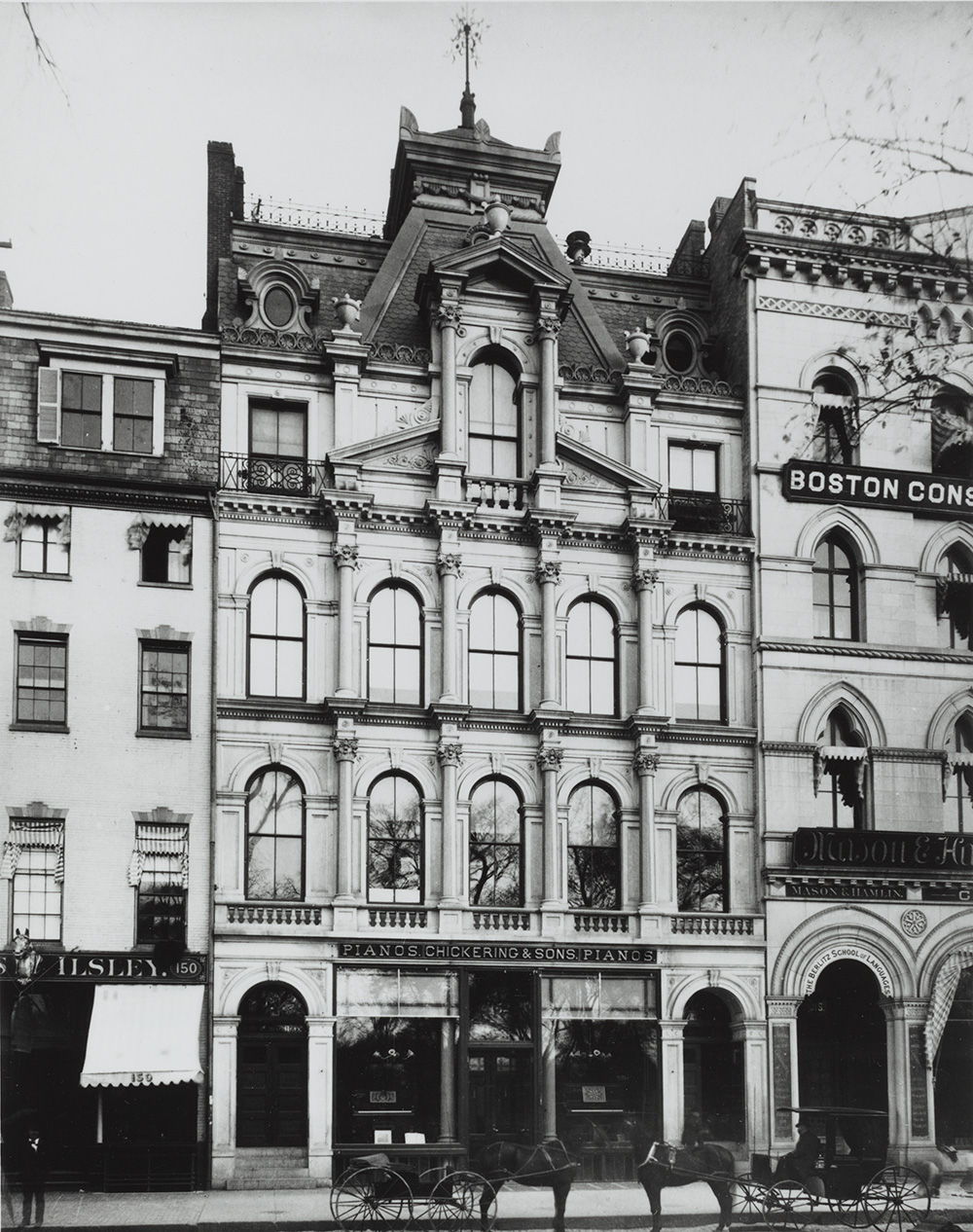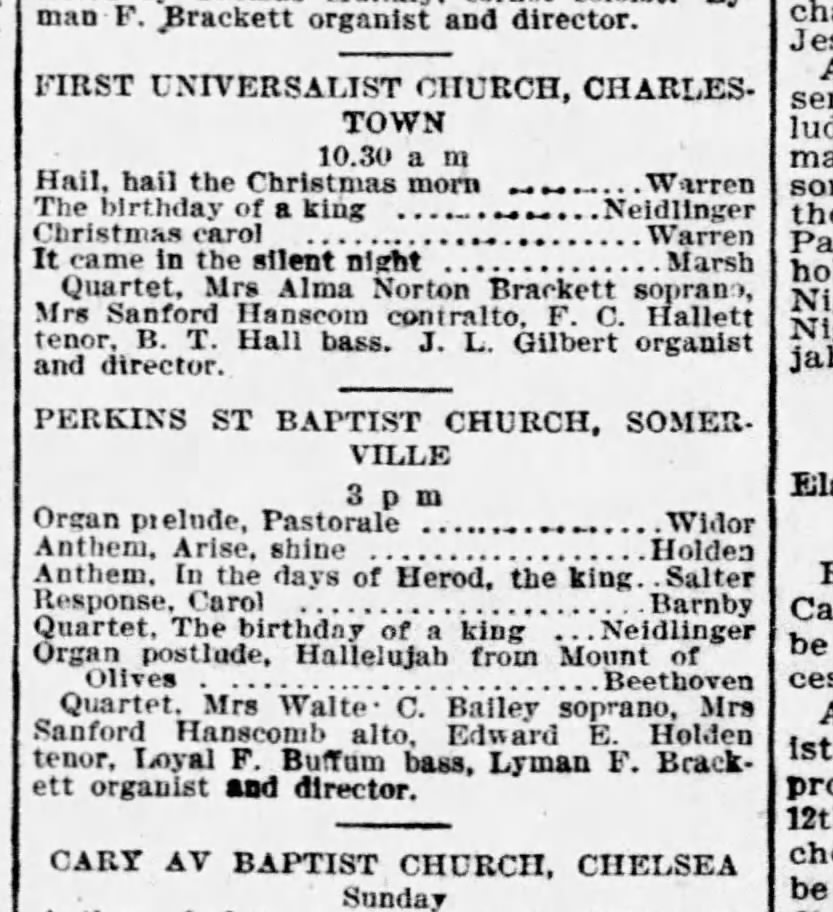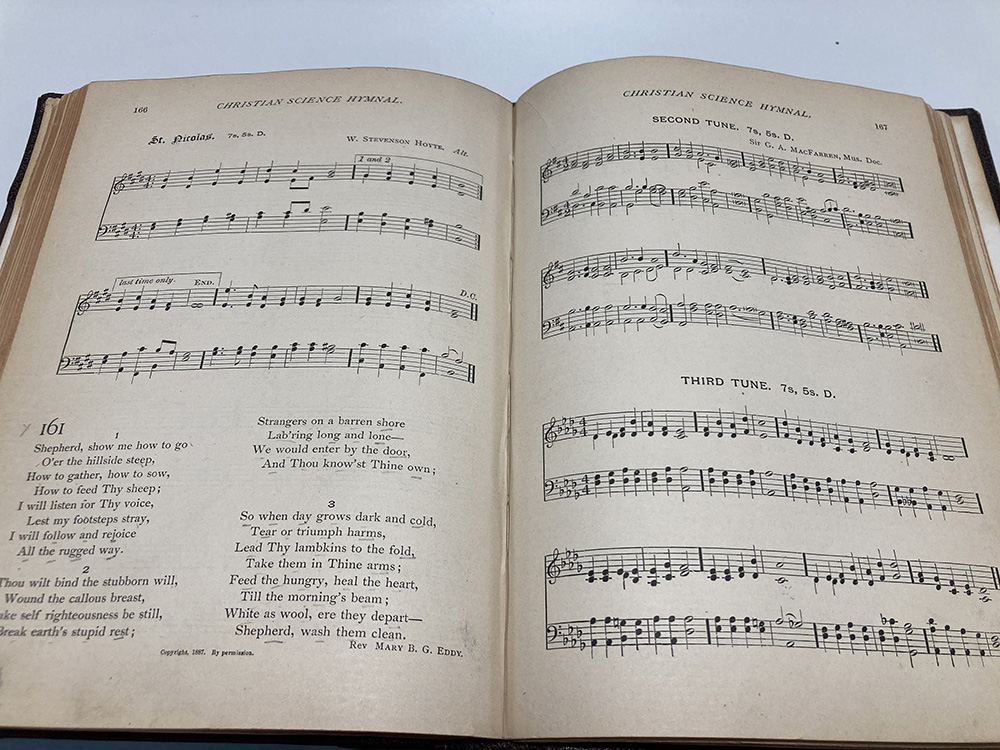The Christian Science Hymnal: History, Heritage, Healing
The Christian Science Hymnal: History, Heritage, Healing
The Christian Science Hymnal: History, Heritage, Healing
Chapter 4
The work of Lyman Brackett
Born in Charlestown, Massachusetts, Lyman Foster Brackett (1852–1937) was an organist, music teacher, and composer. At age 19 he took a job with Oliver Ditson & Co., a Boston music store and music publisher, where he worked until the mid-1880s. In 1886 that company published Brackett’s first musical composition—a short choral piece titled “Christmas Carol.”
Click image to enlarge
A newspaper clipping announces Christmas musical performances by Alma and Lyman Brackett. The Boston Globe, December 22, 1894.

Chickering Hall, 152 Tremont Street, Boston, undated. Photograph by Soule Photograph Co. Courtesy of Historic New England.
A Christian Science connection
Brackett’s interest in Christian Science may have resulted from the location of his music teaching studio, at 152 Tremont Street in Boston. This address also housed Chickering Hall, the auditorium where followers of Mary Baker Eddy’s new religion began holding their meetings in 1885. Always attentive to the quality of music played in those services, Eddy took notice of Brackett. She requested his participation in various events, planned to raise money for a Christian Science church building in Boston.
In 1886 the Scientists bought land in the Back Bay district, which would eventually become the site of The Mother Church (The First Church of Christ, Scientist). The March 1887 Christian Science Journal reported on a concert planned to help the fundraising effort:
Rev. Mrs. Eddy will address the National Christian Scientist Association meeting of April 13th, and at the close of the meeting there will be a concert in aid of the church building fund, under the management of Lyman Brackett, C. S. The programme gives the following talent: Mrs. E. Humphrey Allen, soprano; Miss Gertrude Edmands, contralto; Mr. C. N. Allen, violinist; Mr. Wulf Fries, violin, cellist, and Mr. Lyman Brackett, pianist.
Such a bill cannot fail of filling the house. The price of admission will be one dollar. The hall is not yet decided upon. All would more than willingly pay the amount to hear our Teacher, and our Western, as well as Eastern friends, will appreciate this coterie of able artists, dear to the Boston heart, who are doing so much for our Cause.”4
On May 4, 1887, Eddy requested that the Christian Scientist Association make Brackett an honorary member, in gratitude for all he had done for the young church. There is no record of his ever having joined The Mother Church, although in his letters to Eddy he spoke of himself as a Christian Scientist.5
New contributions in song
Eddy asked Brackett to compile the first edition of the Christian Science Hymnal, published in 1892 (see Chapter 2).6 He was also editor of the Hymnal’s 1898 revision. As part of this work, he composed alternate tunes to most of the hymn texts included in the first edition. Of note, he composed settings for three of Eddy’s poems: “‘Feed My Sheep,”’ “Communion Hymn,” and “Christ My Refuge.” Ultimately, most of his tunes were dropped, including Hymn 1 below (see Chapter 3).
Listen to two tunes by Lyman Brackett from the 1892 Hymnal
“From all that dwell below the skies” (words by Isaac Watts, Hymn 1)
“O’er waiting harpstrings of the mind” (“Christ My Refuge,” words by Mary Baker Eddy, Hymn 163)
Eddy’s correspondence with Brackett between 1887 and 1892 documents her desire that he compose music to “‘Feed My Sheep.’” He also produced two solo arrangements for that poem, making it the first of hers to be published as a solo for use in Christian Science church services.
The March 1888 Journal reported on a christening service for children, which Eddy presided over as pastor. It took place on Sunday, February 26, 1888, included the singing of hymns, and ended with the solo for “‘Feed My Sheep’” that featured words by Eddy and music by Brackett:
Chickering Hall was crowded Feb. 26, for a service which has long been desired by many of the members of the church. After a hymn, Scripture-reading, Lord’s Prayer, and another hymn,— “I think when I read that sweet story of old,”7 twenty-nine children, including a few babes, were led to the platform, and placed in semicircles. Rev. Mrs. Eddy then moved about slowly among them. From each she received a card on which was written the child’s name. Raising her hands over each in turn, she then repeated the name, and very slowly and emphatically pronounced this blessing: “May the baptism of Christ with the Holy Spirit cleanse you from sin, sickness, and death.” No water was used in the rite, but it was nevertheless impressive, and resembled a union of the ordinary service of Infant Baptism with the Confirmation service of the Episcopal Church…. After this address Mrs. E. Humphrey-Allen sang one of Mrs. Eddy’s hymns (music by Lyman Brackett), addressed to the Good Shepherd [“‘Feed My Sheep’”]. The collection was then taken, as usual, and (also as usual) the congregation very slowly dispersed.8
Click images to enlarge
Brackett to Eddy, February 9, 1887. 472.54.006.
‘A sympathetic collaborator’
Brackett lived for the rest of his life in Boston. In 1930 he responded to a letter from the Christian Science Board of Directors, regarding tune names for his compositions to be published in the upcoming 1932 revision of the Hymnal. In his response, he gave a glimpse into his earlier friendship with Eddy:
At first I had the supreme privilege of a personal acquaintance with Mrs. Eddy –including many private interviews. It was at her earnest request that I assumed the task and responsibility of [compiling] the original [Christian Science] Hymnal– comprising the selection, arranging and composing of all the tunes ….
Mrs. Eddy not only urged me to accept the position of organist at the Mother Church which I was obliged to decline because of a previous contract, but she strongly advised me to remain in my musical profession and help Christian Science by influencing my pupils and friends which I have constantly and consistently done from that day to this …. I live in the recollections of her associations and teachings.9
In the same letter, Brackett suggested tune names for two of the five settings he composed for the 1932 Hymnal.10 He offered four possible names for his setting of “‘Feed My Sheep’”: ASSURANCE, CONFIDENCE, GUIDANCE, and RELIANCE. For “Christ My Refuge,” he wrote, “instead of ‘Eddy’ [the tune’s original name], I would like Norton.” Norton was the birth surname of his wife, Alma. His setting of “‘Feed My Sheep’” was titled GUIDANCE in the 1932 Hymnal.11 He concluded:
Sincerely wishing you — the Board of Directors – and the hymnal Committee, all of whom I hope to meet sometime — a happy and prosperous New Year,
I am Cordially Yours In Christian Science,
Lyman Brackett
The close association that Eddy shared with Brackett occurred while she was still shepherding her fledgling church as its active pastor. This helps explain her direct concern with all aspects of its services, including the music—for which she found in him a sympathetic collaborator.12
Click image to enlarge
Eddy’s poem “ ‘Feed My Sheep,’ ” with Brackett’s composition appearing as THIRD TUNE in the 1892 Christian Science Hymnal. This tune has remained in subsequent editions.
Recorded hymns in this chapter are from the Christian Science Hymnal, 1892 edition, and performed by Christa Seid-Graham (voice) and Bryan Ashley (keyboard).
© ℗ 2024 The Mary Baker Eddy Library. All rights reserved.
Chapter notes:
- Peter J. Hodgson, A Most Agreeable Man (Chestnut Hill, Massachusetts: Longyear Museum Press, 2003), 11.
- “Mrs. Alma N. Brackett,” Obituary, The Boston Globe, 28 December 1938, 17.
- There are no known photos of either Alma or Lyman Brackett. ancestry.com: Source, accessed 6/20/2023
- “Notes and Comments—In Aid of the Church Building Fund,” The Christian Science Journal, March 1887, 309.
- Mary Baker Eddy to Christian Scientist Association, 4 May 1887, L09021; Hodgson, A Most Agreeable Man, 13.
- Lyman F. Brackett to the Christian Science Board of Directors, 31 December 1930. Reminiscence File, LSC009.
- With words by Englishwoman Jemima Luke (1813–1906). “I think when I read that sweet story of old” is a well-known children’s hymn.
- This ceremony was not repeated. ”Christening Service,” Journal, March 1888, 629.
- Brackett to Board of Directors, 31 December 1930. Reminiscence File, LSC009.
- Hymns 154, 197, 254, 298, and 304.
- Brackett to Board of Directors, 31 December 1930. Brackett’s setting of the hymn “In Thee, O Spirit true and tender” was titled ALMA, also apparently referencing Alma Norton Brackett.
- Hodgson, A Most Agreeable Man, 4.




